It's good to challenge ourselves from time to time. To run a marathon, for example. Or log a new personal best for the 10K. Learn a new technology. A new sport. Anything that might test our mettle. Personal growth via increasingly challenging experiences. You know » Tony Robbins stuff.
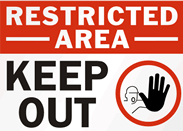 Nietzsche challenges me like that. Tho in a different way. He goes deep .. to the very foundations of our Western belief systems. An area normally off-limits.
Nietzsche challenges me like that. Tho in a different way. He goes deep .. to the very foundations of our Western belief systems. An area normally off-limits.
Anything considered part of our belief system automatically gets password-protected and receives appropriations from the defense budget. This area is heavily guarded and protected at all costs.
Normally I'm not receptive to people or things that question & challenge (attack) my most basic beliefs. (Few are, from what I can see.)
Seems however, like it might be a worthwhile exercise. Like weightlifting .. where we endure an uncomfortable struggle (temporarily) .. that leads to growth & development.
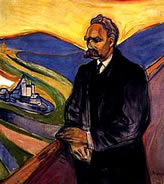 » Grenades
» Grenades
Reading Nietzsche feels like someone walking thru your mind wearing a bandolier of grenades, lobbing them, one after another, at everything we (in the Christian Western world) hold sacred.
He does this with the following rationale » I have seen where your belief systems are taking you and it suks to the point of being pathetic.
Yet he also describes WHY (it suks). And here is where Nietzsche flexes his philosophical muscles. Rather impressively. He makes his points well.
The most prominent 'feeling' I got from reading Nietzsche is » What balls! What gigantic huevos rancheros!
He goes after (attacks) the very foundation of Western civilization itself .. and he doesn't stop until until he arrives (axe in hand) at the doorstep of Christian morality. Cajones gigantos.
Nietzsche's father was a Lutheran pastor, as was his daddy before him. Friedrich's use of scripture makes it clear he was familiar with both the bible & Christian doctrine.
From there, he takes the reader to the floors below Christian morality. When the elevator door opens, he starts poking around, saying (I'm paraphrasing):
"Look over here, dude. You're getting your knowledge from your beliefs. You got it backwards. There's the source of your problem. No wonder you're so screwed up. Can't believe nobody has pointed this out before. You should be getting your beliefs from your knowledge. You need to believe less and doubt more."
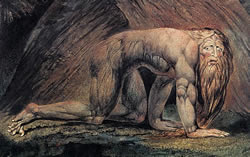 » Nebuchadnezzar & Insanity
» Nebuchadnezzar & Insanity
Let's pause here a moment to note that Nietzsche went insane. He had a mental breakdown in his mid-40's and never recovered. Spent his last 10 years as toast. Then he died (August,1900, age 55).
Remember the story of Nebuchadnezzar? (~600 B.C.) He went crazy, too. God layeth down the smack on ol' king Nebby. Ka-blammo! Next thing you know, Nebby is out in the field munching grass beside the cows.
"You will .. live with the wild animals and eat grass like cattle .. until you acknowledge that the Most High is sovereign.."
Not very regal, is it? [ Some think it was syphilus, and not God that/who drove Nebby nuts. Sames goes for Nietzsche. ]
 » The Sign
» The Sign
It's probably just my imagination .. but I see a foreboding sign hanging over the entrance to Nietzsche's garden (more like minefields):
Beware! All who dare enter here
Remember what happened to Nietzsche.
Signed: God
P.S. This is the guy who said 'God is dead'.
If you listen, you can hear the howls of FN echoing from the nearby forest .. where he's searching for more tasty grass. Same forest Nebby roamed.
••• today's entry continues here below •••
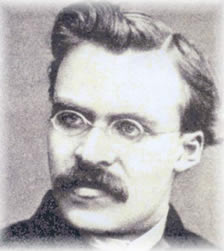 » Enter at your Peril
» Enter at your Peril
Now I've obviously ignored that sign and entered Nietzsche's orchard. (I've been known to have some cojones myself from time to time.)
I picked some of the low-hanging fruit I found there .. to share with you, so you might get a flavor for this guy.
Anyway, I'm looking around. And the first feeling I get is » Holy krap
(.. to use less-profane vernacular). My initial impression is » No wonder he went nuts.
Of course, I don't live there. I'm only a visitor (.. for reasons mentioned at the beginning of today's entry).
Purely reconnaissance. Scouting the foreign territory. Assessing his positions. Identifying his fortifications. Mapping FN's strongholds. Vigilantly on the look-out for exposed weaknesses. You know » populate the database.
I do not yet possess enough information to offer a proper critique. He has been called one of the most misunderstood philosophers in history. His ideas, thus far, have been quite entertaining.
Need to armor-up before entering Nietzsche's garden .. cuz you know it's coming at you. Protective gear. Bulletproof vest. Kevlar, the lightweight one. Lock-n-load. Incoming!
So now, back out here .. in the 'real' world, I have to ask myself » Do I feel a little crazy?
The answer » Maybe I do. Maybe I do.
=)
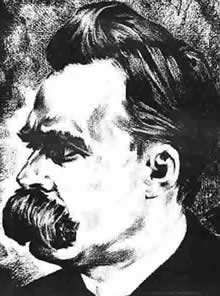 » Bring it.
» Bring it.
Nietzsche's most famous quote (I'd guess) is » What does not destroy me, makes me stronger.
That embodies the Nietzsche spirit.
The quote sheds light on what I said in the previous entry .. about using Nietzsche's insanity as a (backwards) way of validating his ideas. I'll expound on that idea in a future entry.
I mean, I know (or accept) it was the siphylus. But there is talk that a form of "mental pathology" ran in the Nietzsche family (on his dad's side), something the Nietzsche family tried to cover-up after FN's death .. records show.
Nietzsche's sister (younger, only) was the most enthusiastic conspirator. This isn't surprising, since she had the most to lose should her brother's reputation be tarnished .. after she assumed control of his work, aka the Nietzsche Archive.
The conclusion that the cause of his dad's death was not hereditary "seems" justified. But nobody can say for sure .. cuz we're talking rural Germany in the mid-19th century. So everyone must draw their own conclusion. In the end, does it really matter?
Cuz here's what I know for sure:
- FN said some remarkably insightful stuff.
- He said some crazy-sounding shit.
Seems we're left to determine which is which.
Note how his quote represents a bold, daring, winner-take-all approach. (Some might even say 'reckless'.) You can almost hear him say, Bring it.
No wonder the Nazi's were so enchanted with him. (Tho not the other way around, since FN died long before Nazis came to power.)
Regarding the much-discussed Nietzsche-Nazi connection, it should be noted evidence exists that Nietzsche's sister (Elisabeth) was an anti-semite who both assembled & edited Will to Power (Der Wille zur Macht) from her brother's notes. I think the 'connection' begins there.
Take a moment and note that Nietzsche found his breaking point, which (according to General Corman) every man has. Crashed thru with spectacular starburst colors. Never to return. Wild man. Did he push himself that far/hard? See his quote from 1873 published » here, which says:
"For what purpose humanity is there should not even concern us: why you are there, that you should ask yourself: and if you have no ready answer, then set for yourself goals, high and noble goals, and perish in pursuit of them! I know of no better life purpose than to perish in attempting the great and the impossible..."
[ For what it's worth, both Nietzsche & Che were sickly children. Interesting data-point. Both warlike as adults. Hey, notice both men have 'che' in their name. Coincidence. Reminds me of Porsche. ]
Speaking of coincidences, I've been feeling run-down & beat-up lately, after reading Mr. Grenade-tosser .. enough to pop an Advil & pick up some Floradix (iron supplement) at Mother's Market. [ Yes, my body is adjusting to the yoga. I'm sure that's part of it. ] Think I needed the iron, cuz I'm starting to feel better already.
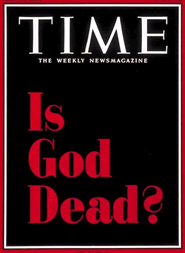 » Cajones Gigantos
» Cajones Gigantos
Check out the following hair-raising passage .. contained in the Preface (written June 1885) to Beyond Good & Evil (.. considered one of Nietzsche's greatest books):
"How could such a disease infect Plato, the most beautiful outgrowth of antiquity? Did the evil Socrates corrupt him after all? Was Socrates in fact the corrupter of youth? Did he deserve his hemlock?
But the struggle against Plato, or to use a 'popular' idiom, the struggle against Christian-ecclesiastical pressure of millennia -- since Christianity is merely Platoism for the people -- has created a magnificent tension of spirit in Europe, the likes of which the earth has never known."
Socrates is the philosophical founder of our Western civilization. A demigod, revered by all Western scholars. (Well, almost.) Could also be he's just the philosophical father of its founder (Plato). But it's one or the other.
Even the book's subtitle » A Prelude to a Philosophy of the Future .. seems to suggest a ballsy » "While all you loser-philosophers busy yourself with the past & the present, I'll be taking us into the future. Step aside, Dawg."
The book starts deep and heads immediately for open water. You're swimming from the get-go.
»  Socrates
Socrates
Socrates himself claimed to know nothing .. except that he knew nothing. (Yeah, right.) And he had a way of telling people, You don't know jack, either.
He would get people to take a position on questions .. such as:
Is moral social behavior good because it is pleasing to the Gods, or is it pleasing to the Gods because it is good?
Then he'd back them into an unsustainable corner .. by presenting them with a series of increasingly pointed questions, which I think is called dialectics. What's really brilliant, tho, is that he could do this regardless of which position a person took.
He pissed people off. The wrong people. Powerful people. They condemned him to death (.. by drinking hemlock, a poison) .. for corrupting the youth. You know the story.
And everybody knows » one man's corrupter-of-youth is another man's bringer-of-enlightenment. (Just as one man's terrorist is another man's freedom-fighter.)
»  Perspective
Perspective
Which brings us to something Nietzsche called » perspectivism. His holy grail. It all depends on which side of the fence you stand, no?
Knowing where you stand (knowing thyself) helps you see more clearly, more fully. Certainly more accurately. This is why the ancients made such a big deal about 'knowing thyself.'
Difficult to chart a course if you don't know where you're starting from.
Similar difficulties might arise if a person (not you or me, of course) don't know who they really are. This might affect decisions made charting a moral course, no?
And while discovering things about ourselves, we're bound to bump up against things people have told us that we are .. or maybe even demanded that we be .. or suggested, or inferred.
Incongruity here (.. between how we really feel about something and how we think we ought to feel..) can generate 'pressure' (or 'tension') .. something gay people are very much aware of, I'd guess.
Which is also why ignorance is sometimes associated with bliss. (Speaking of bliss .. the courtroom is very much about perspective.)
I'll leave you with a quote from the book [epigram #153]:
"Whatever is done out of love takes place beyond good & evil."
How does he know that? Is it self-evident? I don't think so. I think you have to experience that. (And I could not agree more.) Nietzsche was a lover? Now there's a radical thought.
Nothing about Nietzsche is sugar-coated. Industrial strength ideas. Savage at times. He bends your thoughts hard, vigorously, like a strong, aggressive wrestler.
It's hard to describe (and sounds a bit wacko) but you can actually feel this bending. Not physically, but something inside gets torqued when you apply Nietzsche's ideas full strength. There is a wrestling or sorts, of ideas. And like real wrestling, it too can be fatiguing.
 Okay, one more passage (.. from chapter 9, titled » What is noble?):
Okay, one more passage (.. from chapter 9, titled » What is noble?):
"You cannot entertain any illusions about how an aristocratic society originates. The truth is harsh. Let us not be deceived about how every higher culture on earth has begun.
Life itself is essentially a process of appropriating, injuring, overpowering the alien and the weak .. oppressing, being harsh, imposing your own form, incorporating, and at least, the very least, exploiting."
Nothing sugar-coated about that. Caring for an insane Nietzsche .. doubt that was a picnic.
This is not the bit on Nietzsche I mentioned doing here. This is merely an intro and a status report, which you might find interesting. Need to mull over everything he has said before I can offer pointed insight.
Nietzsche is not easy to figure out .. much harder than Che. (I'm not surprised he has been called one of the most misunderstood philosophers in history.)
Nietzsche's birthday is this Friday (.. the 15th).
For more along these lines, here's a Google search preconfigured for the query » nietzsche
All FN's online works posted » here.
Reading Nietzsche feels like a self-induced spiritual crisis. Yes, it's good to challenge ourselves. (I hope.) Yo Friedrich, bring it. Bring your Nazi-inspiring philosophy, Dawg.

First, a congratulation: taking on Nietzsche is no small matter. As always, it's good to be fearless in approaching Big Ideas.
Second, a warning; historical context is very important when it comes to these philosophers, every bit as important an influence as their personal circumstances. Aside from Kierkegaard (a close predecessor if not a direct influence) it is well worth studying the Hume -> Kant -> Mill progression which laid the ground he tilled, as well as the flowering of later 20th century philosophy aware of his contribution, both mathematical (Shaw/Hilbert -> Church/Turing -> Goedel) and social (Heidegger, Popper, etc).
I'd put off a Guide until you'd looked into Nietzsche's antecedents and successors just a little more, because when you look at "weaponization" - the poetry, the influential power of his words - the soundness of his reasoning isn't equally yoked with it.